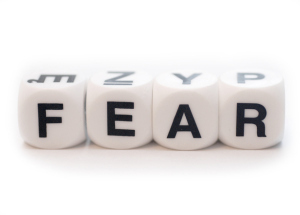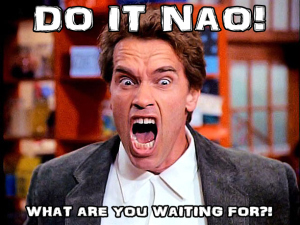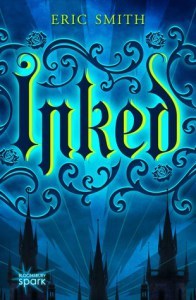Nate Philbrick's Blog, page 14
December 19, 2015
Saturday Smorgasbord – Ideas Needed!
Welcome, reader, to another installment of Saturday Smorgasbord, where I celebrate this week’s accomplishments (if any), tell you what I’m currently up to (if anything) and clue you in on exciting stuff to come (if any)!
The Children of Falore takes a new direction
Last Saturday I revealed the title for my next novel (The Children of Falore). Since then, I’ve been a bit stuck. Fighting to meet my daily 1500 word quota led me into a dead end chapter. Subsequently, I realized I needed to shake up the first act a bit, and I’m super excited about the new path!
I’ll be adding a series of new chapters culminating in one called ‘The Deranged Dryad King And His Bride’. I think this new direction will make the first act much more exciting (though a bit longer than originally planned).
Judgment Wheel hits the ground running
So, the pre-order period for Judgment Wheel ended Thursday night, and I’m pleased with the results! Upon official release, the short story sat at #13 on Amazon’s YA short reads (30 min) list. I’m actually writing this post ahead of time, so I don’t know where it’ll be ranked now. Thanks so much for your pre-orders and help spreading the word!
Nearing the 2000 follower mark
I want to do something fun to celebrate when I reach 2000 followers on Twitter (if you don’t follow, click that button to the right!), but I’m afraid my bank of ideas is running dry these days. Any suggestions? What’s a good way to get the community involved in this milestone? Drop a comment below and let’s get brainstorming.
Sunday reviews – I need your ideas
Last week I gave my review of Inked, a novel by Eric Smith, as a test-run of a weekly review post. Given the positive feedback, I’ll be continuing on with a review every Sunday. I need your suggestions! I mostly read fantasy (YA or not), but I can definitely be flexible, so if anyone has a good book to recommend, please leave a comment or let me know via Twitter!
That’s it for this weekend, I think. I’m looking forward to your input! If you haven’t subscribed yet, do that as well. Have a great weekend, all.
December 18, 2015
Caring For Your Writer 101
Having a writer in your life can be confusing. Maybe you’re not sure how to take care of it. Should you take it for walks? How often do you feed it? Don’t worry. I’ve got answers. Here are some ways to properly care for your writer this Christmas.
Keep plenty of hot chocolate/coffee/tea in the house.
Buy little festive marshmallows and/or cookies to go with the aforementioned beverages.
Force your writer out for a walk once a day.
Make sure it returns from said walk.
Give your writer space and quiet to work in.
Make sure your writer’s eating enough…
…but not too much.
Buy appropriate Christmas gifts for your writer.
Books
Another mug
Books
Warm fuzzy slippers
Books
New sticky-notes, notebooks, and pens
But not red pens. Never red pens
Gift cards for books
A seventh cat
Hug your writer once per hour.
Do not try to hug your writer if it barks at you when approached.
Express excitement over your writer’s next book.
Avoid trigger-words such as deadline, editor, agent, typo, or rejection.
Pretend not to be worried about your writer’s Google search history.
Reassure your writer you love and cherish it.
Gently remind your writer that sleep is important even during the holidays…
…but don’t bother waiting up for it.
When your writer does put away the laptop/notebook, welcome it back into the land of the living gently and soothingly.
If your writer spooks and runs, do not call the police. It probably knows how to evade them.
Leave an open book and a bag of coffee grounds by the back door. Your writer will return safely.
Be generous with your signs of affection towards your writer.
Wrap your gifts in printouts of all your writer’s good reviews.
Surprise your writer by hanging the Hemingway ornament near the top of the tree this year.
Remember that, at the end of the day, your writer appreciates and loves you too!



December 17, 2015
10 Ways To Beat Writer’s Block
Writer’s block. The anti-muse. Some of you believe in it, some of you don’t. The truth is there are days when the writing just isn’t happening, and you need to shake things up to get the creative juices flowing. Here are ten ways to do that.
Take a shower: a great way to take a break and ‘restart’ the day. Or just stand there and pretend to be a water spout.
Go do something outside: an active body leads to an active mind. Take a walk, ride a bike, shoot hoops…whatever you enjoy.
Listen to music: music can help visualize the scene you’re trying to write or inspire you with new ideas to crack open.
Have a drink: having something to sip on just does the trick. Tea, coffee, wine, whatever your prefer. I explore this topic more in detail in my article on coffee and writing.
Do something repetitive: repetitive motions keep you distracted yet active, which is the perfect time to let your mind wander. Crafts, coloring, construction projects, cleaning, etc. can all help.
Go be with people: get out of your writing space and go have a conversation or two. Maybe a hug for good measure.
Keep fresh air circulating: Open windows and doors and let the breeze trickle through. Sunlight, the sound of rain, birds, and smells are other potential bonuses that will help unlock your creative side.
Read: I don’t know about you, but reading other people’s work makes me eager to get back at my own.
Find support from other writers: turn to those who know what you’re going through and can motivate/encourage you to keep working hard.
Keep the end goal in mind: nothing motivates me to write more than hearing people brag about their accomplished goals. Set daily objectives, but also always have the long-term goal in your sights. Whether that’s a full novel or a short story, picture how it will look when it’s finished. Then chase after that image and get it done.
Your turn. What do you do when you’re suffering from writer’s block (or whatever you want to call it)? These are the ten that work best for me, but each writer is different. Drop a comment below, and don’t forget to share/subscribe!


December 16, 2015
The Benefits Of #Writing For Introverts
I’m a very introverted person. You know the type. I’m not a fan of meeting new people, crowds stress me out (a lot), small talk is taxing, and I rarely feel the need to go out and socialize. The whole package.
While I don’t view those traits as flaws, writing fiction, networking with other writers and readers on social media, and blogging have helped me and changed me as a person in a lot of ways. Here are four of the most significant ways writing has been good for me as introvert.
Writing allows me to express myself
Through my stories and characters I’m able to express thoughts, ideas, experiences, and emotions that I otherwise tend to keep bottled up inside me.

Writing enables me to confront my own fears
No, I’m not talking about my passionate fear of big spiders, bears, or the ocean. Everyone knows about those. I mean fears regarding life, myself, and other people. The fears I don’t talk about. Through writing, I can face them vicariously and come out stronger on the other side.

Writing forces me out of my comfort zone
Being a serious writer involves doing hard things, like interacting with total strangers, presenting myself to the world, and letting other people read and respond to my work. It’s scary, but it’s healthy.

Writing helps me connect with people
Since I started taking my writing seriously, I’ve had the privilege of ‘meeting’ and interacting with a lot of fantastic, unique people, especially through Twitter and blogging. You guys are all awesome, and I’m thankful for (and humbled by) each comment, share, and conversation.

Obviously, these aren’t the only benefits of writing, and the don’t apply exclusively to introverts. But these are some of the big ones for me as an introvert, and I’m sure for others as well.
So. Are you introverted like me? Extroverted? Somewhere in between? We’re all different, but I know writing has had a huge impact on all of us. How has it helped or changed you? Drop a comment below and as always, don’t forget to share/subscribe!


December 15, 2015
Writer, you NEED to keep a notebook
“I’ll remember it later.” It’s the lie that sentences countless ideas to oblivion each day, especially for writers, since we’re ceaselessly coming up with and processing new ideas.
Fresh ideas have a knack for hitting us out of nowhere: in bed, in the shower, out for walks, at our day job, during meals, etc.
So we say, “I’ll remember it later.” Except we don’t, because that’s one of the biggest fibs since I read and agree to the terms and conditions.
The solution isn’t a mystery: keep a notebook. Or, if you don’t like the bulk, try sticky notes. Or a phone app. Anything that lets you jot down ideas as quickly as you can and come back to them later.

I stubbornly refused to follow this sage advice for a long time, and I wonder how many great ideas were lost because of my pride. I thought my brain was a steel cage. Turns out it’s more like a wad of Silly Putty.
Now I keep a notebook. Jotting things down has become a healthy habit. Here’s a sample list of what sort of ideas get barfed onto the pages:
New story ideas
Character and plot points for current works-in-progress
Future blog post topics
Potential character names
Novel title ideas
Daily schedules
Character relation charts
Map sketches
A to-read list
Character traits
Word-count objective charts
Random memos and errands
Nerdy pickup lines (just kidding…or am I?)
Not only do I use my notebook to record and store all those lists, plans, and brainstorming results, I also write in it. For a variety of reasons I prefer to write scenes and chapters on my laptop, but sometimes I need to go by hand, whether that’s due to Internet distractions, travel, really good weather outside, etc.
So I’m joining forces with all the other voices urging you to start keeping a notebook with or near you at all possible times. You won’t regret it, and your future brilliant ideas will thank you.
And no, you probably won’t remember it later.

Do you keep a notebook already? What do you write in it? Where else do you jot down fresh ideas? Let me know in the comments, and don’t forget to share and subscribe!


December 14, 2015
Writing Tense Scenes
So you’re writing a scene in your novel and you really want this moment to get your reader’s heart hammering. Here are eight practical strategies to help you can achieve that.
Raise the stakes for that particular scene
The higher and more immediate the stakes are, the more tension readers feel. Put your characters in situations where they have to make a hard decision or perform a hard action right away, and make it clear that if they fail, something disastrous will happen as a consequence.
Focus on action and dialogue
Action and dialogue are the two main vehicles of tension. Minimize description, thought-processes, exposition, etc. as much as possible.
Shorten your sentences
Short sentences convey tension more than long ones because they quicken the pace of the scene. Long sentences force the reader to slow down, so cut, cut, cut.
Eliminate subject nouns and pronouns
Remove subjects (whether nouns, proper nouns, or pronouns) to create punch-packing sentences. For example:
“Curtis locked eyes with the man trying to kill him. He bellowed. Charged. Swung his fist.”
Force the reader to pause and absorb the tension packed into each word. Be careful, though, as using this technique too often may be distracting. Blake Crouch uses this method a lot in the Wayward Pines trilogy.
Use strong action verbs
Eliminate linking verbs, auxiliary verbs, and passive voice verbs as much as possible for maximum tension. Choose action verbs that specify the exact meaning of what you want to convey.
“Curtis ran dashed across the rooftop. He was heading headed straight for the assassin.”
Withhold information as long as possible
The unknown is one of the keys to tension in a scene. If there’s a plot point or piece of information that relates to the conflict/stakes in a big way, keep the reader ignorant for as long as the plot allows.
Lead up to a specific conclusion
Tension increases when the reader knows something big is coming, and tense scenes need purpose. If you hint at a twist/reveal, be sure to deliver. A tense scene without a satisfying ending is like telling a child to close his eyes and then not giving him the surprise.
Give readers privileged information
If the reader knows something significant that the character doesn’t, they’ll feel tension for the character. Aim for the classic “Don’t go there! Don’t you know that…?” reaction.
These are just some of the ways you can increase the tension in your novel’s scenes. Try them out, combine them, and find what works best for you.
In the meantime, drop a comment below with your thoughts, and don’t forget to subscribe! Write on, friend.


December 13, 2015
Sunday Book Review – Inked (Eric Smith)
So I’m going to post a review of an indie book every Sunday (hopefully) as a way of sharing what I’ve been reading and spreading the word!
To start off the new rotation, I present to you Inked, by Eric Smith.

Inked (Eric Smith)
General Information
Genre according to Amazon: fantasy, sword and sorcery, coming of age.
Length (print): 217 pages.
How I found it: recommendation on Twitter.
Amazon blurb:
Tattoos once were an act of rebellion. Now they decide your destiny the moment the magical Ink settles under your skin.
And in a world where Ink controls your fate, Caenum can’t escape soon enough. He is ready to run from his family, and his best friend Dreya, and the home he has known, just to have a chance at a choice.
But when he upsets the very Scribe scheduled to give him his Ink on his eighteenth birthday, he unwittingly sets in motion a series of events that sends the corrupt, magic-fearing government, The Citadel, after him and those he loves.
Now Caenum, Dreya, and their reluctant companion Kenzi must find their way to the Sanctuary, a secret town where those with the gift of magic are safe. Along the way, they learn the truth behind Ink, its dark origins, and why they are the only ones who can stop the Citadel.
Amazon Rating: 4.1 stars (35 customer reviews) at the time of article publication.
My Thoughts
Caution: some spoilers ahead, though I’ll do my best to not reveal the ending.
First impression: I was excited about Inked right from the start. The cover art is beautiful and the blurb promises a lot of exciting adventure. I read the free sample on Amazon, and that was enough to convince me to buy it.
Strengths
The highlights of Inked lie mostly in the first 3rd of the story, which, in my opinion, was a good display of entertaining writing.
Fantastic beginning: Inked has one of the best opening chapters I’ve read in some time. Right away we meet Caenum (the protagonist) and Dreya (his friend). Their personalities are vibrant and different, and there’s enough playful tension between them to have me hooked.
Efficient pacing: the pacing in the early parts of the story is fantastic. Things clip along so that I was never bored, but neither was I overwhelmed with action sequences.
Entertainment value: simply put, the story is fun.
Kenzi’s introduction: Kenzi’s development from an arrogant Scribe to a vulnerable Conduit is well crafted despite the fact that it happens within the first few chapters.
Molivar: even though his appearances are few, Molivar is one of my favorite characters. He’s mysterious, dark, and even though he’s clearly bad, I kinda liked him.
The best: in my opinion, the best thing Inked has going for it is the early relationship between Caenum and Dreya. I felt their mutual interest since day one, but they’re not the typical ‘in love’ couple. They act like genuine friends, and that made me really look forward to their development in the later stages of the book.
Weaknesses
Despite the strong beginning, at around the 40% mark (in ebook terms), Inked starts to unwind. By the time the third act rolls around, it’s completely fallen apart.
Mediocre characters: with the (partial) exception of Dreya, Kenzi, and Caenum’s grandmother, all the characters (especially secondary) were pretty boring and cliche. I didn’t connect with any of them. They felt like plot devices more than people.
Poor editing: the first 3rd of the book was polished. The last two 3rds felt like the editor just stopped caring. Repetitive, distracting sentence constructions and some blaring typos kept me from engaging with the story.
Plot tropes: Inked relied on a handful of plot tropes to carry the story forward, which would have been fine if they’d been developed beyond their trope status. They weren’t.
Reunion of the protagonist with a long-lost, mysterious father.
Discovery of magic powers within oneself.
Elemental abilities distributed between the main characters (earth, fire, electricity, ice, etc.).
Protagonist living with a relative because of missing/dead parents.
Poor dialogue: throughout most of the story (worse later on) the dialogue felt forced and unnatural.
Crammed plot: for such a short book, there was too much going on. I never quite cared about the plot itself because it simply tried to do too much in so little time.
Confusing plot elements: in the 217 pages of the book, we’re introduced to Inked people, Scribes, Conduits, the Citadel, Citadel Guard, Freedman, Unprinted, and more. Each ‘faction’ has their place in society, but I never quite got what differentiated them from each other. Some use magic, some can’t (I think), some don’t know it, some do…it’s a bit of a mess.
Disappointing relationship development: remember how I said I was looking forward to the progression of Caenum and Dreya’s relationship? Yeah…there is none. At the end of the book, they haven’t really changed in terms of character development. What you see on page 1 is what you get at the end. What could have been the best part of the novel turned out to be…well, not much at all.
Conclusion: Inked had a lot of potential and a promising beginning. The story quickly spiraled into cliches, and the characters weren’t much better. Top it all off with some poor editing and what felt like lazy writing, and you get a pretty disappointing product. I’m not sure how Inked manages to hold a 4.1 star rating on Amazon. Kudos to the cover artist, though.
My final rating: 2/5 stars.
(I paid for my copy of Inked and wrote this review without involvement in any exchange or deals. Thoughts and opinions are my own. Yours may differ, and that’s fine. Feel free to drop a comment below!)


December 12, 2015
Saturday Smorgasbord -Title Reveal and More
It’s the weekend…finally! It’s been a long week, albeit a productive one, so I’m looking forward to 48h of relative calm. There are, however, a handful of announcements/comments that I think are pretty exciting!
6-Month Celebration
First off, today marks the half-year-anniversary of Little One! Yeah, it’s been six months since the final release of my first self-published novel. Little One has been downloaded about 800 times in that period. Nothing to break out a champagne over, but I’ll take it! Thanks for all the support you guys have been sending my way on that front.
Huge shout-out to my readers
When I transitioned from the old site to You Write Fiction, I expected a slow, uphill climb to gain any traction in the blogging world. Since the first post three weeks ago, You Write Fiction has received 50+ subscribers, nearly 1000 hits, and fantastic community feedback. Thanks so much, guys. You’re all the best, for real.

It’s just the beginning, but I’m thrilled with the growth so far.
Book reviews: your thoughts?
I’m considering posting a book review each week as part of the regular rotation. Is this something you guys would enjoy reading? Is it even kosher to do, since I’m not running an official review blog? I’m new to this! Let me know your opinion in the comments!
Pre-order madness
So earlier this week I self-published my short story Judgment Wheel. I’ve had short stories published in ezines and win contests before, but this is the first time I’m actually publishing one on Amazon. I’m also experimenting with the pre-order feature, so if you haven’t clicked that happy button yet, go do it now! You’d make my day! You can also find out more about Judgment Wheel here.

Title reveal for upcoming novel!
Yay! I finally get to share this. My second novel, a fantasy adventure story, is projected to release in late April. I’ve got a lot of work to do between now and then, but I think I’ve settled on a title. Presenting…
The Children of Falore
I won’t say anything more about it just yet (stay tuned!), but I’m really, really, really excited about this story. And yes, there’s a chance I’ll change my mind about the title. What do you think of it? Please let me know! All feedback welcome! If it sucks, it needs changing, right?
I think that’s all I have for now. I’d love to hear any thoughts you have on any of the ‘topics’, so be sure to drop a comment. If you haven’t subscribed already, do that too! Write on, friends!


December 11, 2015
Where Do Your Story Ideas Come From?
I’ve recently seen people tweeting about where they get their story ideas, and it got me thinking. Even though I’ve only published a novel and a short story (which you can still preorder), I’ve written a handful of other novel manuscripts and quite a few short stories.
It was fun to think back and remember where I got the original story idea for each one. Here’s my list (as far as I can remember):
Art
I’m a visual guy. I like being able to visualize the characters, places, and events of a story. Because of this, most of my inspiration and ideas come from browsing digital/concept art on Pinterest, Tumblr, and other sites.
Dreams
Okay, so it’s a bit cliche to ‘be inspired by dreams,’ but a good number of my finished novel manuscripts (at least four) originated from random dreams that I had. No joke. It hasn’t happened in a long time, as I’ve ‘moved on’ to more reliable idea sources (whatever that means…I need coffee).
Fears
A bit of an odd one, I guess. A few of my short stories are based on my own fears. For example, bears scare the crap out of me (don’t judge). So I wrote ‘A Shot in the Dark’, a short story about a blind girl encountering an angry bear in the woods.
Personal life moments
My life’s not exactly an adventure film, but still. As a matter of fact, the only novel I’ve published so far (Little One) was based on a short story, which was based on a real-life moment (when I left for college for the first time and had to say goodbye to my then two-year-old sister). Yes, I absolutely blew everything out of proportion between the event and the novel, but the inspiration was there.
Songs/music
I firmly believe that a good song tells a story, with or without lyrics. A lot of scenes/moments/events in my fiction were inspired by particular songs or soundtrack pieces, especially by geniuses like Koji Kondo or the master himself, Hans Zimmer.
So where do you get your story ideas/inspiration from? I’d love to hear from you, so drop a comment below and don’t forget to follow/subscribe!


December 10, 2015
On The Rules Of Writing Fiction
Before self-publishing my first novel, I was the kind of guy who loved rules, especially those related to writing. I studied them, memorized them, and expected others to do the same. I still value rules, but my perspective has changed.
Some of you current readers/subscribers have been following me since way back in the days of Flash Flood Fiction (my old site). You’ll remember that most of my articles there were ‘how-to’ or ‘how-not-to’ oriented. In a lot of them I was pretty adamant about what writers should or shouldn’t do to make their storytelling better.
I don’t think the same way nowadays. Self-publishing a novel (with its many challenges, mistakes, and learning opportunities) made me realize that writing solid fiction isn’t as black-and-white as I thought it was.
I’ve also read a lot more varied books in recent years. As I said in a past article on the self-published market, I’m a picky reader, and since my scope of fiction was narrow, my understanding of what made fiction ‘good’ was also narrow. Expanding my reading range helped me understand (finally) that there are a lot of different ways to write brilliant fiction.
Are there tried-and-true parameters that writers should almost universally stick to? Absolutely. Any and every craft has basic rules of quality. But I believe there are far fewer of them than I used to promote.
I encourage as many writers as I can to study their craft (read up on Sol Stein, Randy Ingermanson, and other fiction gurus) and follow those essential guidelines. These people are much smarter and more experienced than me, and they sure as heck know their stuff.
But I’d also encourage us all to write how we want to write, to innovate, take risks, and explore our own unique abilities. Don’t let other people dictate how you write.
Be teachable enough to study your craft and take advice, but be bold enough to forge your own path from that starting point.
I look forward to seeing what you come up with.







